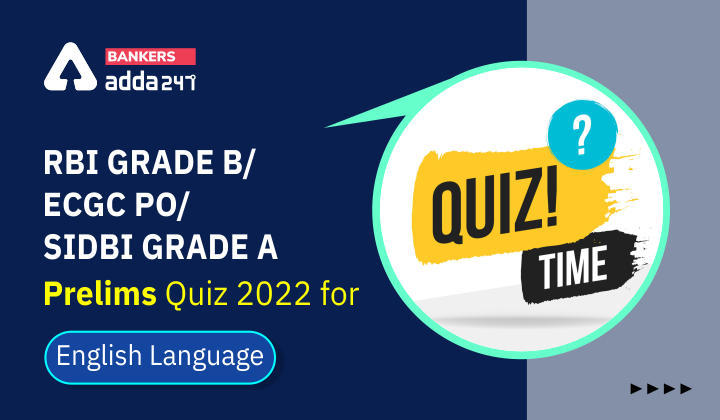Directions (1-5): Read each sentence to find out whether there is any grammatical or idiomatic error in it. The error, if any, will be in one part of the sentence. The alphabet corresponding to that part is your answer. If there is ‘No error’, the answer is (e). (Ignore errors of punctuation, if any.)
Q1. To do that job (A)/ you need to be mentally disturbed (B)/ anthropologically different than (C)/the rest of humanity (D)/ No error (E)
(a)A
(b)B
(c)C
(d)D
(e)No Error
Q2. The Ulster Defence Association has (A)/recently hinted that it (B)/may be prepared to attack (C)/ on dissident republicans (D)/No Error (E)
(a)A
(b)B
(c)C
(d)D
(e)E
Q3.We ordered for coffee (A)/after a long journey to be told (B)/ if we weren’t lunching (C)/they wouldn’t serve us drinks (D)/No Error (E).
(a)A
(b)B
(c)C
(d)D
(e)E
Q4. American troops spread out (A)/ across the area on yesterday (B)/ to investigate what had (C)/ happened and question witnesses (D)/No Error (E)
(a)A
(b)B
(c)C
(d)D
(e)E
Q5. All her life she’s (A)/ never done anything that (B)/ has been worthy for (C)/my admiration and respect (D)/No Error (E)
(a)A
(b)B
(c)C
(d)D
(e)E
Directions (6-10): In the following questions, a sentence is divided into five parts with last part of each sentence is highlighted in bold suggesting the grammatically correct part of the sentence. Out of the four other parts, choose the part of the sentence which contains grammatical or contextual error in it. If the given sentence is both grammatically correct and contextually meaningful, choose option (e) i.e., “No error” as your answer.
Q6. No sooner had I (A)/ gotten my bags (B)/ unpacked when I (C)/ realized that my (D)/ camera was missing. (E)
(a) No sooner had I
(b) gotten my bags
(c) unpacked when I
(d) realized that my
(e) No error
Q7. It was hard to say if (A)/ Alex was withholding facts (B)/ so she couldn’t contest his (C)/ decisions or simply because (D)/ he thought she did not need to know. (E)
(a) It was hard to say if
(b) so she couldn’t contest his
(c) decisions or simply because
(d) he thought she did not need to know
(e) No error
Q8. She cannot sing and she cannot (A)/ play the piano, yet, as some (B)/ early experiments show, (C)/ she could learn mechanically to (D)/ beat out a tune on the keys. (E)
(a) She cannot sing and she cannot
(b) play the piano, yet, as some
(c) she could learn mechanically to
(d) beat out a tune on the keys
(e) No error
Q9. He inquired me (A)/ that why I was (B)/ not going (C)/ to see myself (D)/ to the doctor. (E)
(a) He inquired me
(b) that why I was
(c) not going
(d) to see myself
(e) No error
Q10. I guarded both doll as well as cradle (A)/ with the most jealous care; (B)/ but once I discovered (C)/ my little sister sleeping (D)/ peacefully in the cradle. (E)
(a) I guarded both doll as well as cradle
(b) with the most jealous care
(c) but once I discovered
(d) my little sister sleeping
(e) No error
Q11. Read each of the following four sentences to find out whether there is any grammatical mistake/error in it. Choose the sentence with no grammatical error as the correct answer. If all the given sentences are grammatically incorrect, choose (E) i.e., “None of these” as an answer.
(a) Warriors of light always keep a certain gleam in their eyes.
(b) Priya as well as some of her friends have fallen in love with Mohit, who is the eldest son of S.D.O.
(c) Pakistan’s rhetoric of nuclear strike would then remained mere ranting and raving.
(d) The triangle is one of the most elementary symbolic figure due to its geometric aspect
(e) None of these
Q12. Read each of the following four sentences to find out whether there is any grammatical mistake/error in it. Choose the sentence with no grammatical error as the correct answer. If all the given sentences are grammatically incorrect, choose (E) i.e., “None of these” as an answer.
(a) A life which ends with death, is a worthless life.
(b) In almost all aspects of life, the application of this process will bringing improvements.
(c) The attractiveness of democracy lies in its ability to giving us a peaceful transfer of power.
(d) There is no minefields as farmers till their lands almost up to the international border.
(e) None of these
Q13. Read each of the following four sentences to find out whether there is any grammatical mistake/error in it. Choose the sentence with no grammatical error as the correct answer. If all the given sentences are grammatically incorrect, choose (E) i.e., “None of these” as an answer.
(a) You drown not by falling into a river, but by staying submerged in it.
(b) If you start by promising what you don’t even have yet, you’ll lose your desire to work towards getting it
(c) When you are enthusiastic about what you do, you feel this positive energy. It’s very simple.
(d) The act of discovering who we are will force us to accept that we can go further than we think
(e) All are correct
Q14. Read each of the following four sentences to find out whether there is any grammatical mistake/error in it. Choose the sentence with no grammatical error as the correct answer. If all the given sentences are grammatically incorrect, choose (E) i.e., “None of these” as an answer.
(a) Don’t waste your time with explanations, people only hear what they want to hear.
(b) When you repeat a mistake, it is not a mistake anymore: it is a decision.
(c) People are capable at any time in their lives, of doing what they dream of.
(d) The simple things are also the most extraordinary things, and only the wise can see them.
(e) All are correct
Q15. Read each of the following four sentences to find out whether there is any grammatical mistake/error in it. Choose the sentence with no grammatical error as the correct answer. If all the given sentences are grammatically incorrect, choose (E) i.e., “None of these” as an answer.
(a) Whenever you are coming here, you bring a lot of sweets for me.
(b) All battles in life serve to teach us something, even the battles we lose.
(c) We got everything ready for all of them long before they are arrived.
(d) I feel a certain problems in the execution of this plan.
(e) None of these.
Solutions
S1. Ans. (c)
Sol. Here, the error is in C, where ‘than’ will be replaced by ‘from’. We use ‘from’ right after ‘different’. In case there is a noun after ‘different’, only then we use ‘than’ after that. Such as,
‘I would like to buy a different book than this’. Hence
S2. Ans. (d)
Sol. When ‘attack’ is used as a verb in the sentence, we don’t use ‘on’ with it. But when it is used as a noun, only then we place ‘on’ after that. In this sentence, (D) has an error. Here, attack is used as a verb. So, option (d) is correct answer.
S3. Ans. (a)
Sol. (A) section is grammatically incorrect in the above sentence. Since ‘ordered’ is a transitive verb and therefore object comes right after it. For example, ‘he ordered a cup of tea’. Option (a) is correct.
S4. Ans. (b)
Sol. Part (B) of the given sentence is wrong. Usage of ‘on’ before ‘yesterday’ is grammatically incorrect. As before yesterday, two days before yesterday, the day after tomorrow, today, etc. ‘on’ is not used. So, option (b) is correct answer.
S5. Ans. (c)
Sol. ‘of’ will replace ‘for’ in part (C) of the sentence. ‘Worthy’ is used in terms of ‘worthy of something’ which means ‘deserving something’ but if it’s written ‘for’, it means ‘qualified for something’ or ‘competent for something’. Hence, option (c) is correct answer choice.
S6. Ans. (c)
Sol. Clause (C) is incorrect in the sentence.
‘when’ should be replaced by ‘than’ as syntax of the sentence starting with ‘No sooner’ is ‘No sooner …. than’ whereas in sentence starting with ‘hardly/ scarcely’ is ‘hardly/ scarcely… when/ before’.
Ex. (i) No sooner had I eaten the fish than I started feeling sick.
(ii) Hardly/ Scarcely had he left for Chennai when his father died.
Hence option (c) is the correct choice.
S7. Ans. (a)
Sol. Clause (A) has error in it. The usage of ‘if’ is incorrect. ‘if’ should be replaced by ‘whether’ as ‘or’ is used in the part (D) of the sentence.
‘whether… or’ is used in the sentence to introduce alternative possibilities.
Hence option (a) is the correct choice.
S8. Ans. (b)
Sol. Clause (B) has error in it. The use of ‘yet’ is incorrect here.
‘although’ will be used in place of ‘yet’.
‘Although or though’ is a conjunction that means ‘in spite of the fact that’ and is used to tell the condition whereas we use ‘yet’ in a negative or interrogative clause, usually with perfective aspect, to show that something has not happened by a particular time.
Here, in the sentence, the condition is she could learn mechanically. Hence ‘although’ will be used.
Hence option (b) is the correct choice.
S9. Ans. (b)
Sol. Here the error is in part (b) of the sentence.
The use of ‘that’ is superfluous as in indirect narration, conjunction is not used before ‘Wh- question’.
Ex. He asked me why I was late.
Hence option (b) is the correct choice.
S10. Ans. (a)
Sol. Clause (A) of the sentence is incorrect.
‘and’ will be used in place of ‘as well as’ as conjunction ‘and’ is used after ‘both’.
Ex. Both Sarah and Tammy were watching her.
Hence option (a) is the correct option.
S11. Ans. (a)
Sol. Only option (a) is grammatically correct.
In option (d) ‘figures’ should be used as we use this construction—- one of+ the+ Noun(plural)
In option (b) ‘has’ should be used in place of ‘have’ because the main subject is ‘Priya’
In option (c) remain should be used.
S12. Ans. (a)
Sol. Option (a) is grammatically correct.
In option (b) use ‘bringing’ in place of ‘bring’
In option (d) use ‘are’ in place of ‘is’ because of minefields.
In option (c) ‘give’ should be used in place of ‘giving’
S13. Ans. (e)
Sol. All the given options are grammatically correct.
S14. Ans. (e)
Sol. All the given statements are grammatically correct.
S15. Ans. (b)
Sol. Only Option (b) is correct.
Use ‘you come’ because for present habits we use simple present tense.
Use ‘we had got’ because when we talk about the two events of the past then for the event which happened earlier we use “past perfect”.






